Indigenous Governance Database
NNI and Harvard Project Research
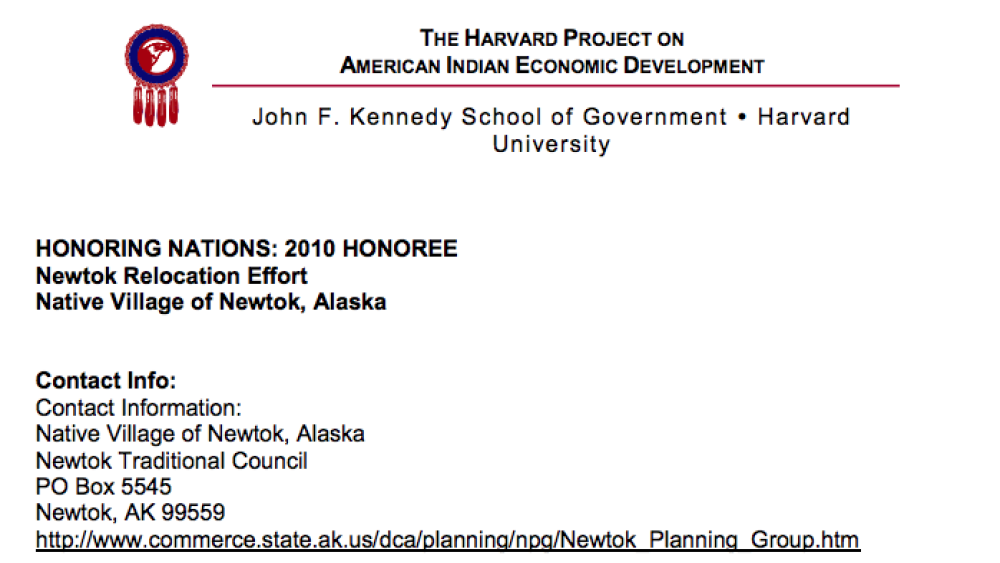
Newtok Relocation Effort
Scientists and politicians spend hours debating the facts of climate change, but in many places damaging changes to the local environment are already a reality. In the past decade, more and more human settlements have been threatened by catastrophic flooding, wildfires, or drought caused by…
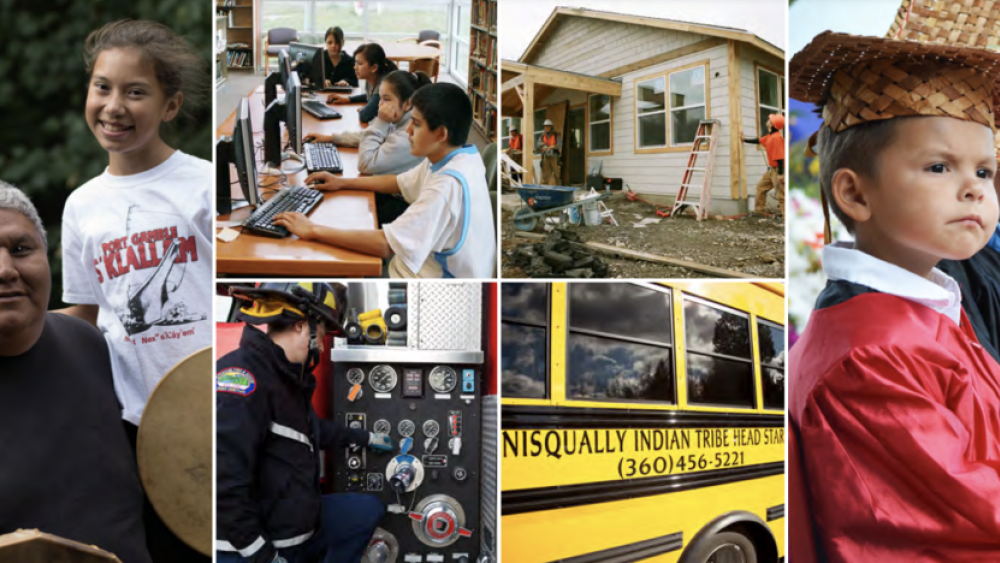
Why beggar thy Indian neighbor? The case for tribal primacy in taxation in Indian country
The law governing taxation in Indian country is a mess. The accretion of common law precedents and the general tendency of states to assert primacy over the taxation of non-Indians create absurd outcomes. This article makes the case three ways. The argument based on the law shows that…
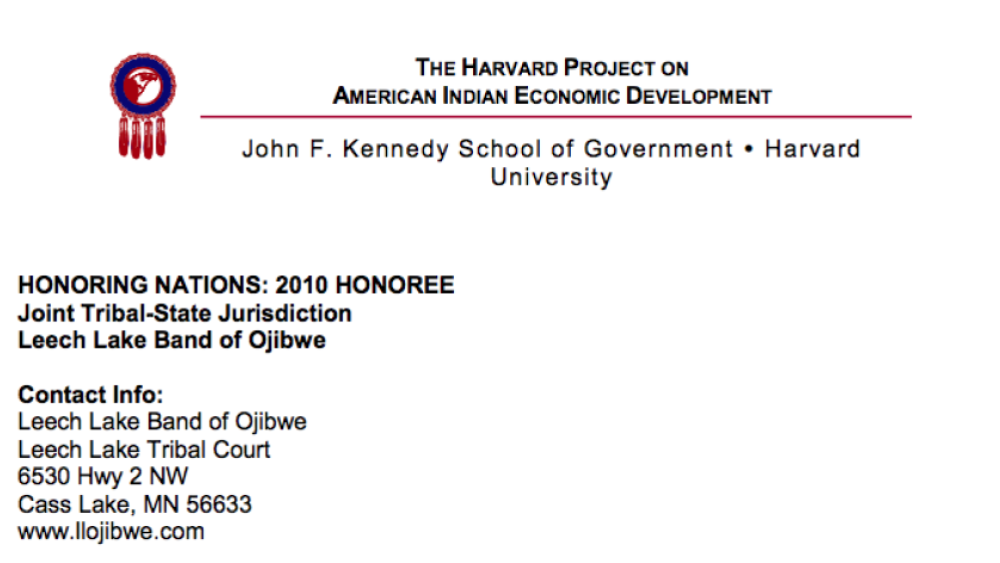
Leech Lake Joint Tribal-State Jurisdiction
Across Indian Country tribes are strengthening and better defining their governments in order to meet the unique needs of their communities. As Native nations work to expand their sovereign powers, tribal justice departments can play a critical role in achieving those goals. In the early 2000s, the…
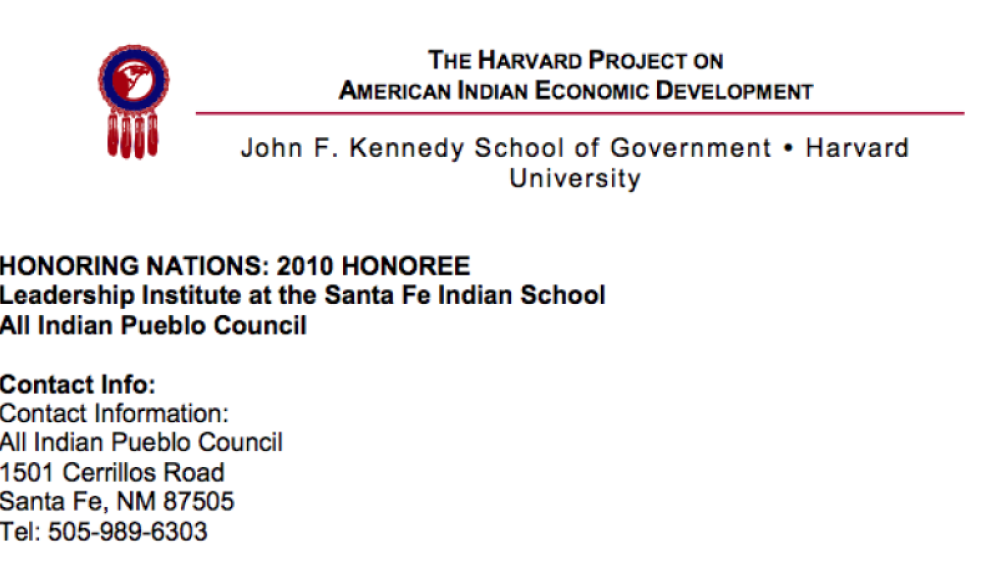
Leadership Institute at the Santa Fe Indian School
Founded in 1997, the Leadership Institute at the Santa Fe Indian School aims to create a dynamic learning environment in which community members not only learn and teach, but are able to actively contribute to the success of their nations. Four themes guide the Institute’s work: leadership,…
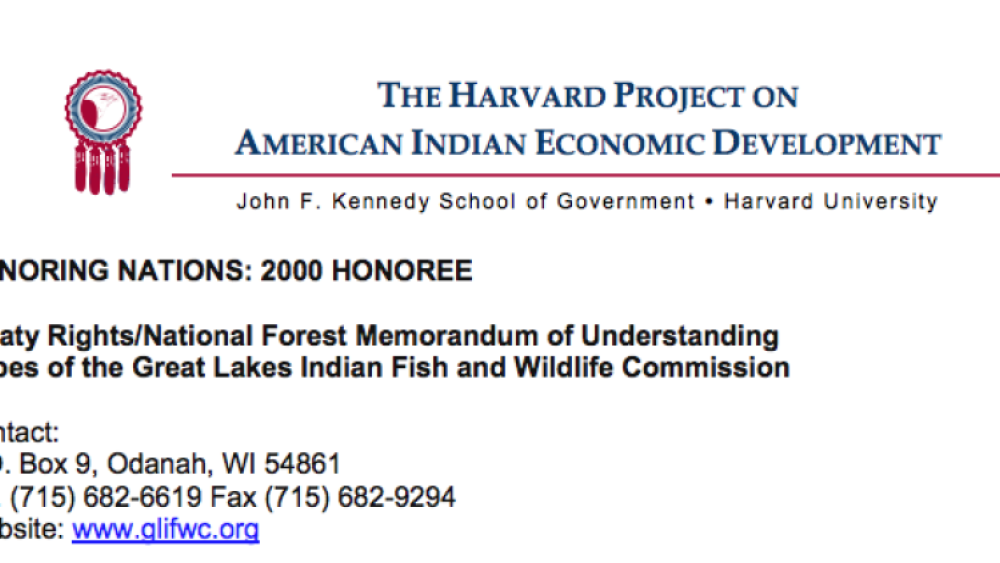
Treaty Rights/National Forest Memorandum of Understanding, Tribes of the Great Lakes Indian Fish and Wildlife Commission
The Great Lakes Indian Fish and Wildlife Commission, a tribally chartered intertribal organization, negotiated a memorandum of understanding (MOU) with the U.S. Forest Service that recognizes and implements treaty guaranteed hunting, fishing and gathering rights under tribal regulations and…
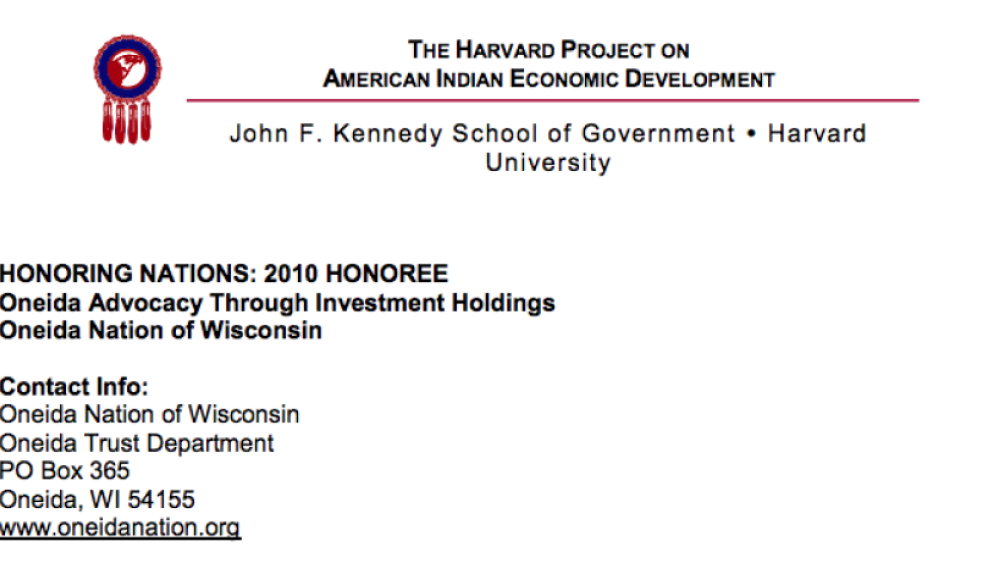
Oneida Advocacy Through Investment Holdings
Thirty years ago, most Native nations in the U.S. had few financial resources available for investment. With the passage of the Indian Self-Determination and Education Assistance Act (Public Law 93-638) in 1975, many tribes began to reclaim the governance of their nations – and with such assertions…
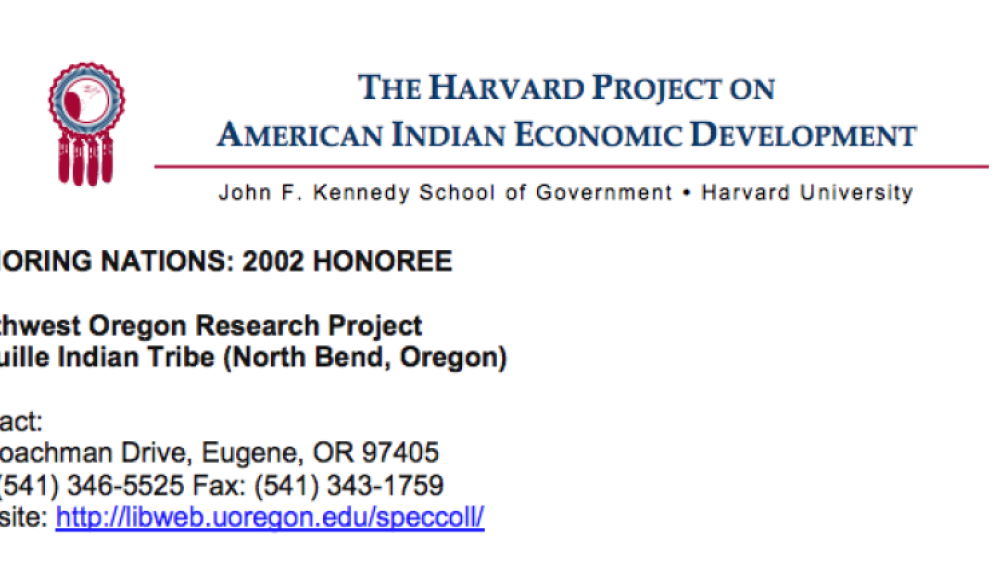
Coquille: Southwest Oregon Research Project (SWORP)
Driven by the belief that possessing historical documents and archival collections is essential for cultural self-determination, the Coquille Indian Tribe partnered with the University of Oregon and the Smithsonian Institution to launch the Southwest Oregon Research Project (SWORP) in 1995. Through…
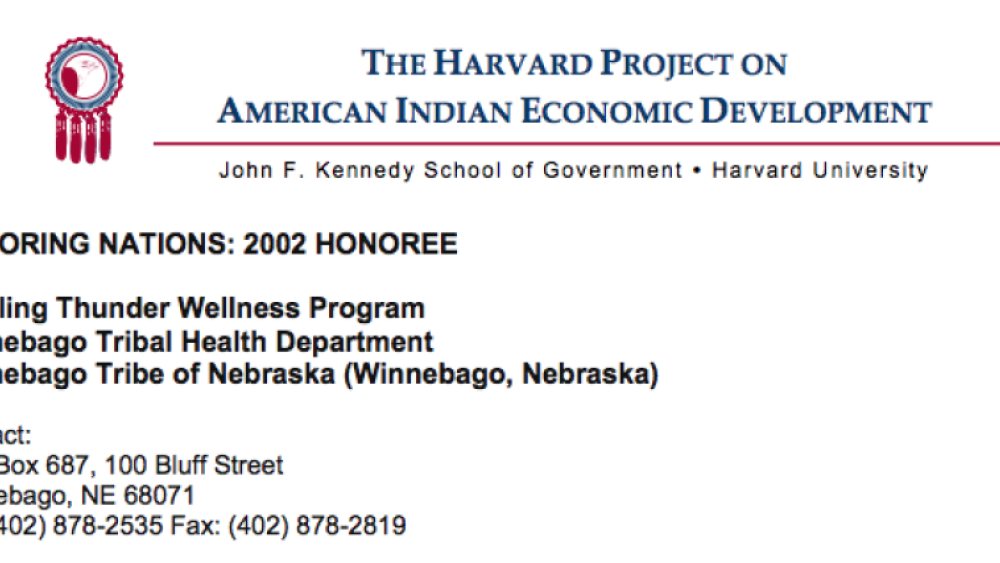
Winnebago's Whirling Thunder Wellness Program
To prevent and control the devastating effects of diabetes and substance abuse, in 1995, the Winnebago Tribe created the Whirling Thunder Wellness Program, which raises community awareness about diabetes and substance abuse, administers primary and secondary prevention services, and encourages…
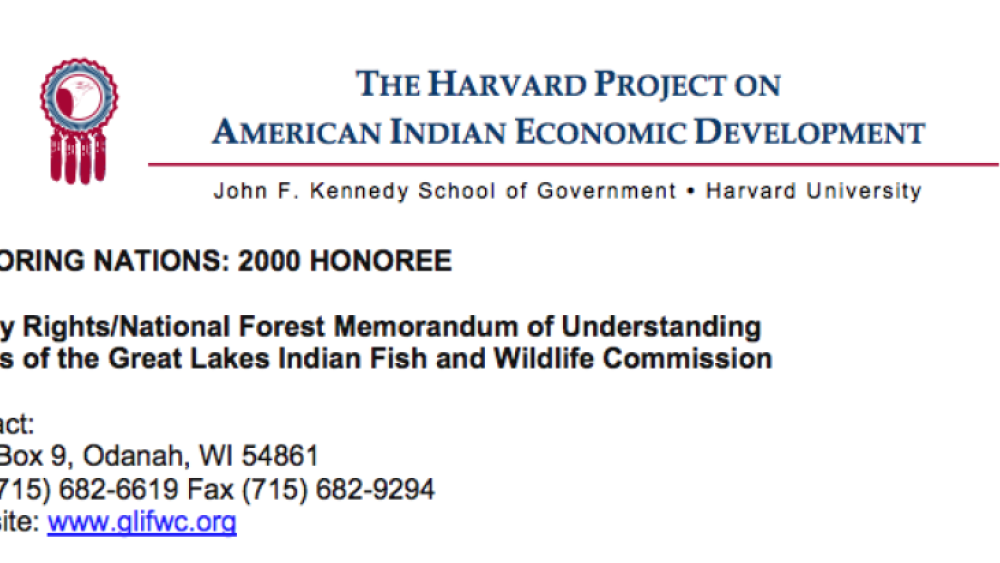
Great Lakes Indian Fish and Wildlife Commission's Treaty Rights/National Forest MOU
The Great Lakes Indian Fish and Wildlife Commission (GLIFWC), a tribally chartered intertribal agency, negotiated a memorandum of understanding (MOU) with the US Forest Service that both recognizes and implements treaty-guaranteed hunting, fishing, and gathering rights under tribal regulations and…
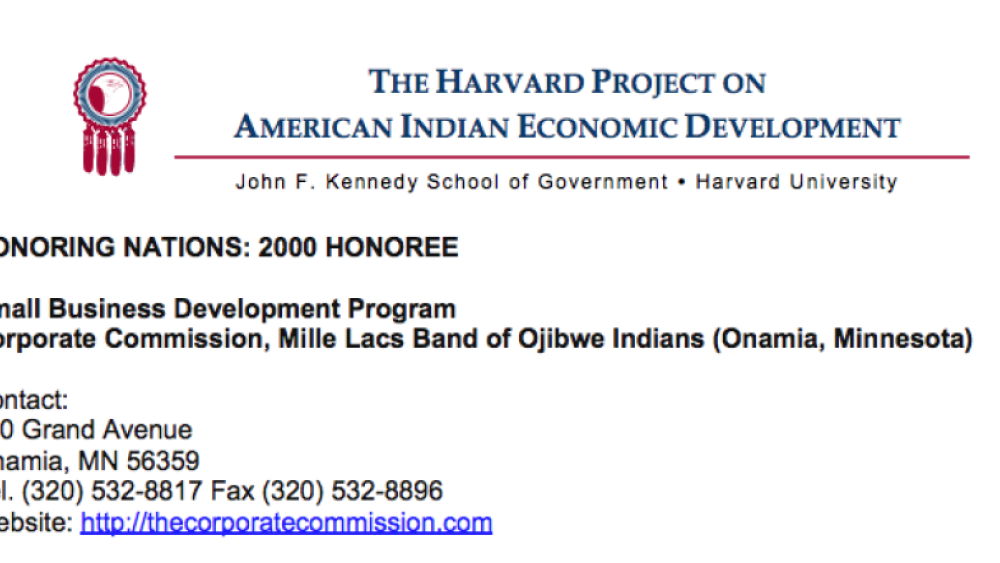
Mille Lacs' Small Business Development Program
The Small Business Development Program assists Band members in developing the private sector economy by providing low-interest loans up to $75,000 to businesses that are at least 60 percent owned and operated by Band members located on or near the Reservation. The Program offers both "micro" loans…
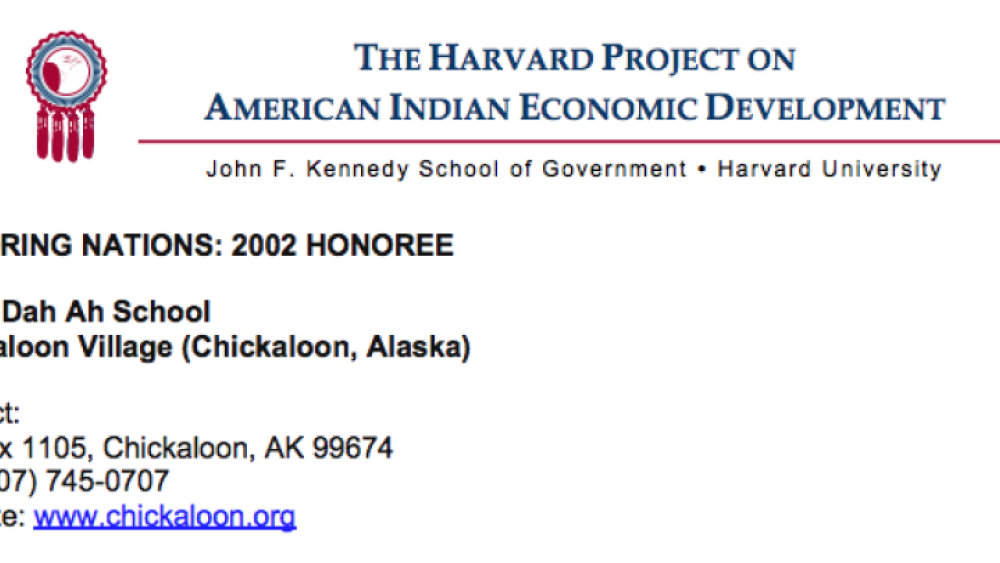
Chickaloon Village: Ya Ne Dah Ah School
Dedicated to giving community youth the skills necessary for functioning in a modern world while retaining and facilitating traditional knowledge and practices, the Ya Ne Dah Ah is Alaska’s only tribally owned and operated full-time primary school and day care facility. Located in a one-room…
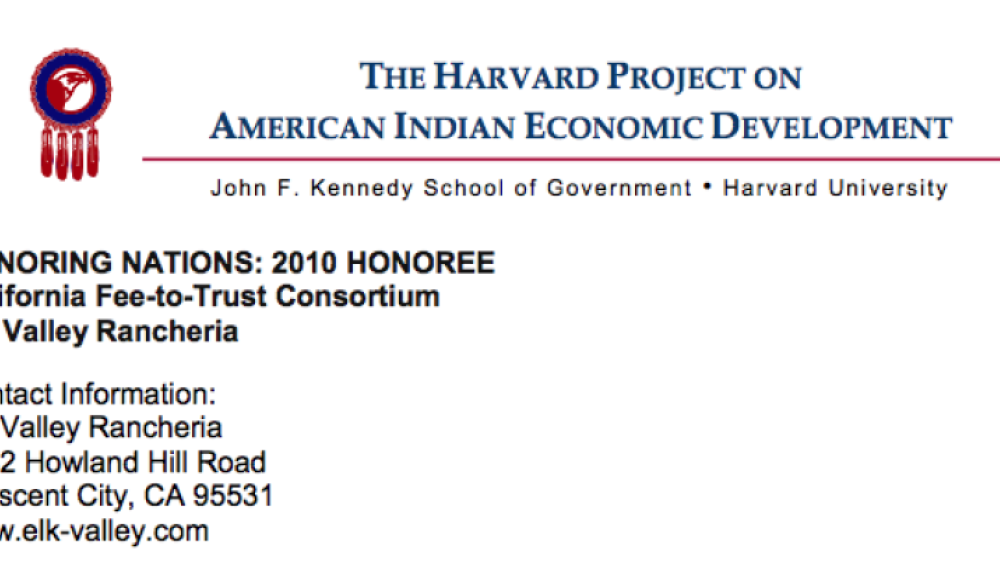
California Fee-to-Trust Consortium
The loss of traditional land is a source of longstanding trauma for Native nations. It has far reaching consequences that began at the time of dispossession and persist today. Many tribes struggle to regain territory in order to support the basic needs of their citizens – housing, economic…
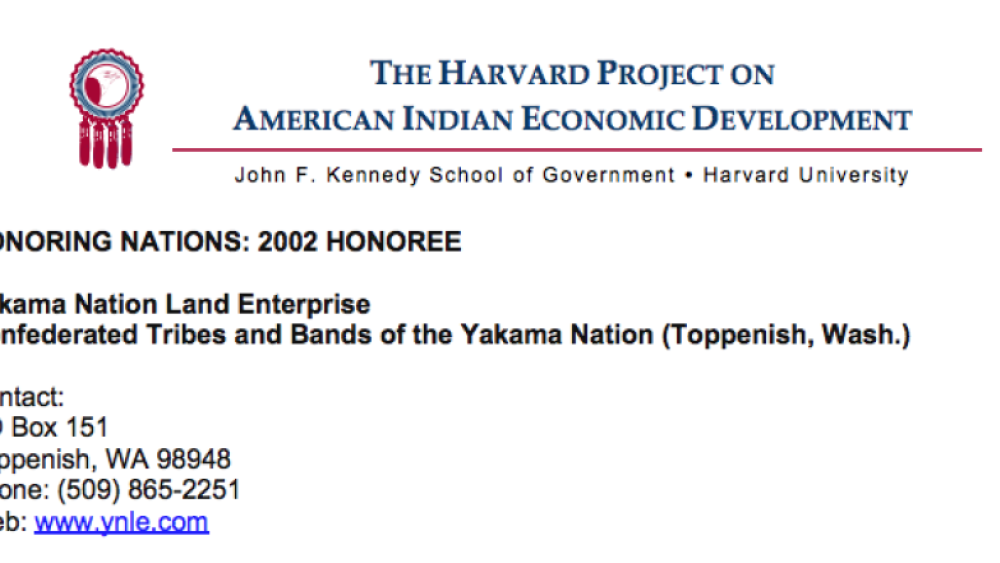
Yakama Nation Land Enterprise
In an effort to consolidate, regulate, and control Indian land holdings, the financially self-sustaining Yakama Nation Land Enterprise has successfully acquired more than 90% of all the fee lands within the Nation’s closed area — lands which were previously highly "checker-boarded." The Enterprise’…
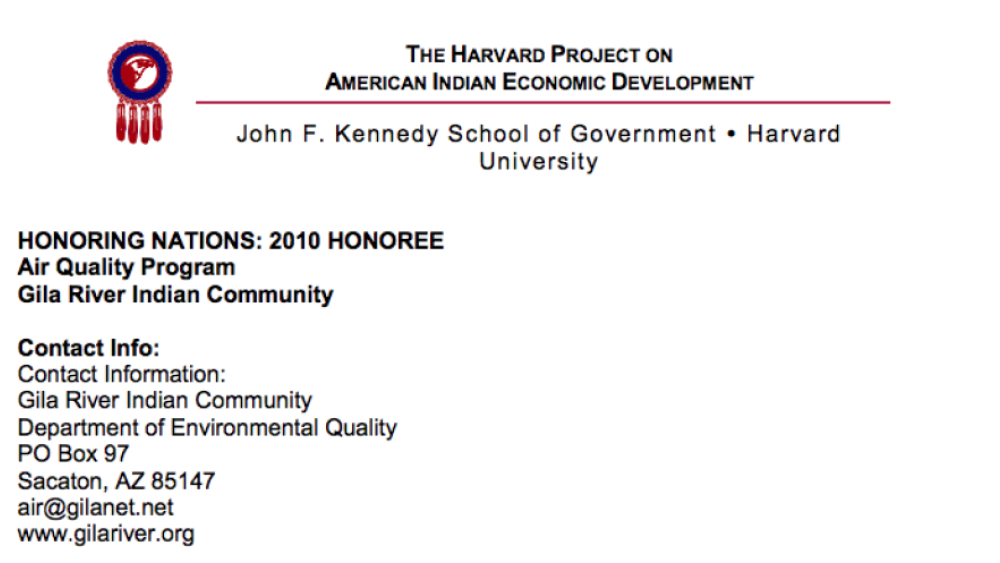
Gila River Indian Community Air Quality Program
In recent years, tribal governments in the United States have passed sophisticated laws and regulations to manage social and economic development in their communities. Although air quality is an important aspect of both economic growth and human health, very few Native nations have successfully…
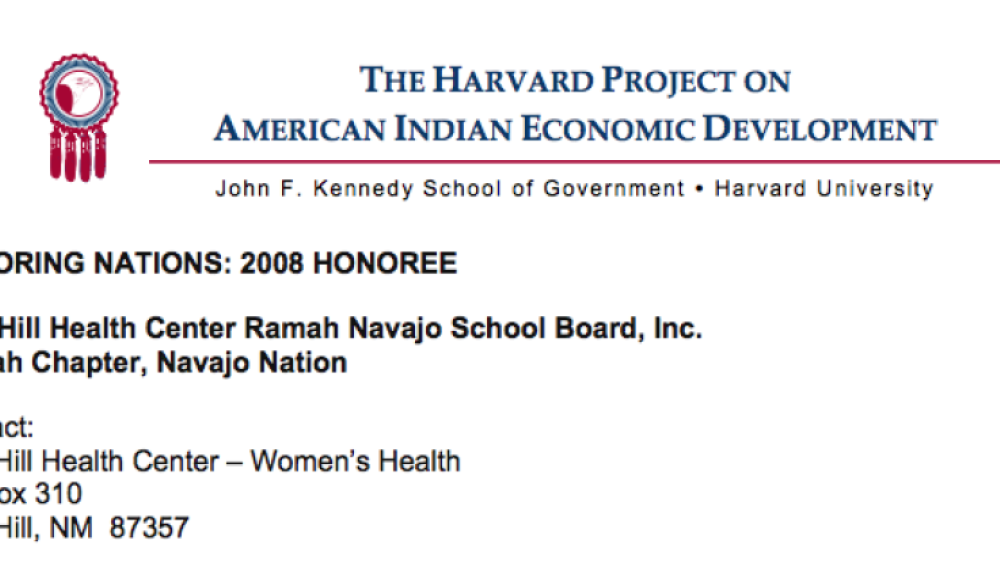
Navajo's Pine Hill Health Center
In the Ramah Chapter of the Navajo Nation–as in many parts of Indian Country–late detection of breast cancer leads to disproportionally high rates of breast cancer mortality. Ramah Navajo’s Pine Hill Health Center devised a creative response: it launched a series of "Mammo Days," educational and…
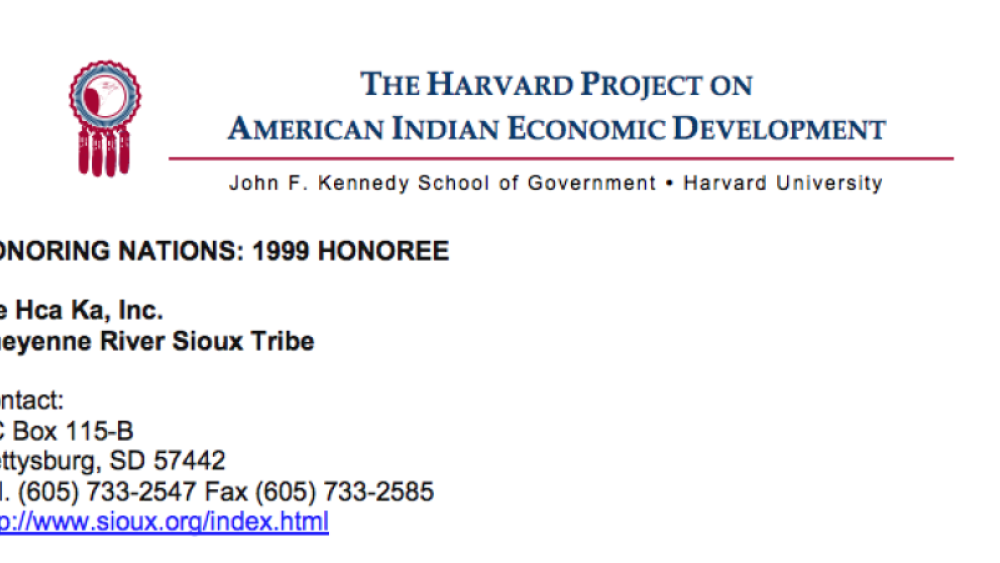
Pte Hca Ka, Inc. (Cheyenne River Sioux Tribe)
This tribally chartered corporation developed a culturally compatible management system for reestablishing buffalo as a focal point for socio-economic development, community cohesion, and self-determination. Pte Hca Ka, Inc. operates a mobile meat processing facility, and is currently seeking…
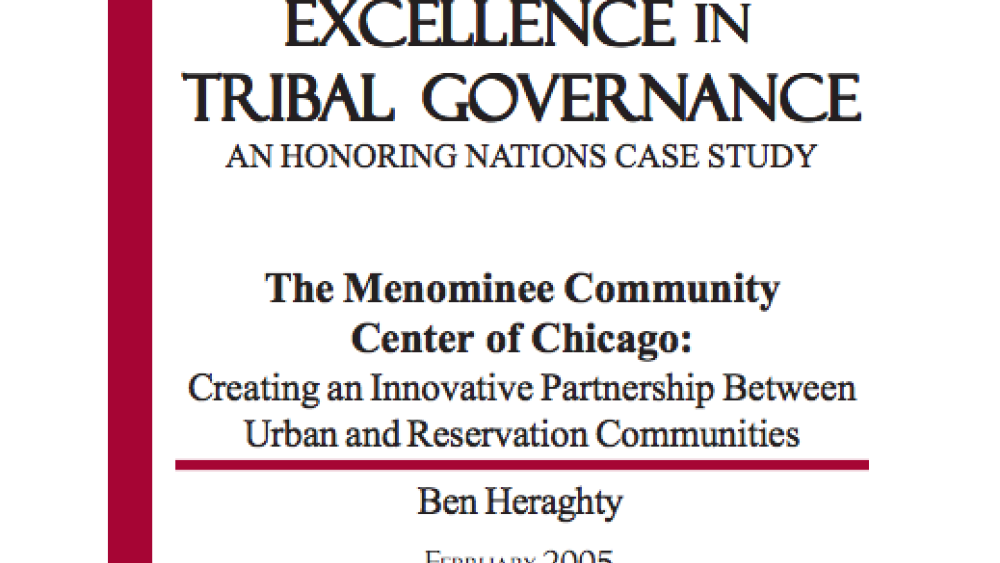
The Menominee Community Center of Chicago: Creating an Innovative Partnership Between Urban and Reservation Communities
Over half of the Menominee Indian Tribe of Wisconsin lives off-reservation. Regrettably, the ties between the Menominee’s reservation and urban populations, like those between the split populations of so many Indian nations, have been tenuous for decades. In 1994, a group…
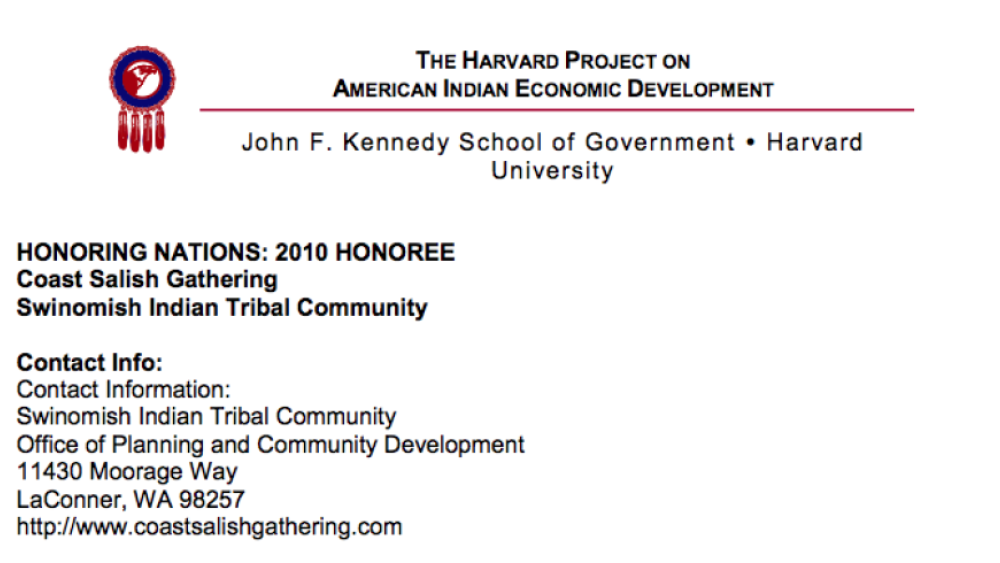
Coast Salish Gathering
Ecosystems in many parts of North America are under severe stress. Pollution, the overuse of natural resources, and habitat destruction threaten local flora and fauna. Conservation attempts often fall short because they target one species of site within an ecosystem. The Coast Salish Gathering…
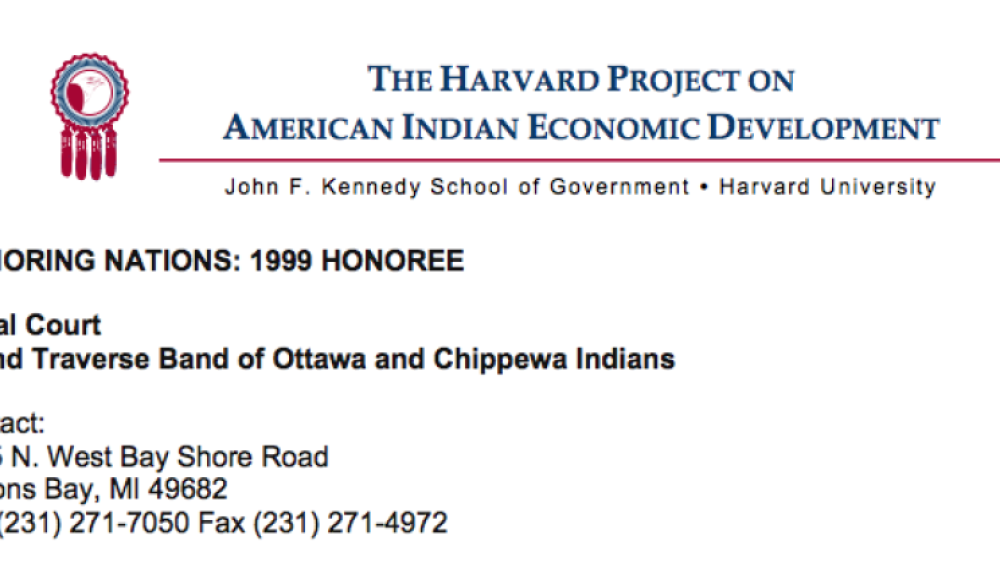
Grand Traverse Band Tribal Court
Constitutionally separated from the political influences of government, the Tribal Court hears more than 500 cases per year, and utilizes "peacemaking" to mediate in cases in which dispute resolution is preferred to an adversarial approach. The Court adjudicates on such issues as child abuse,…
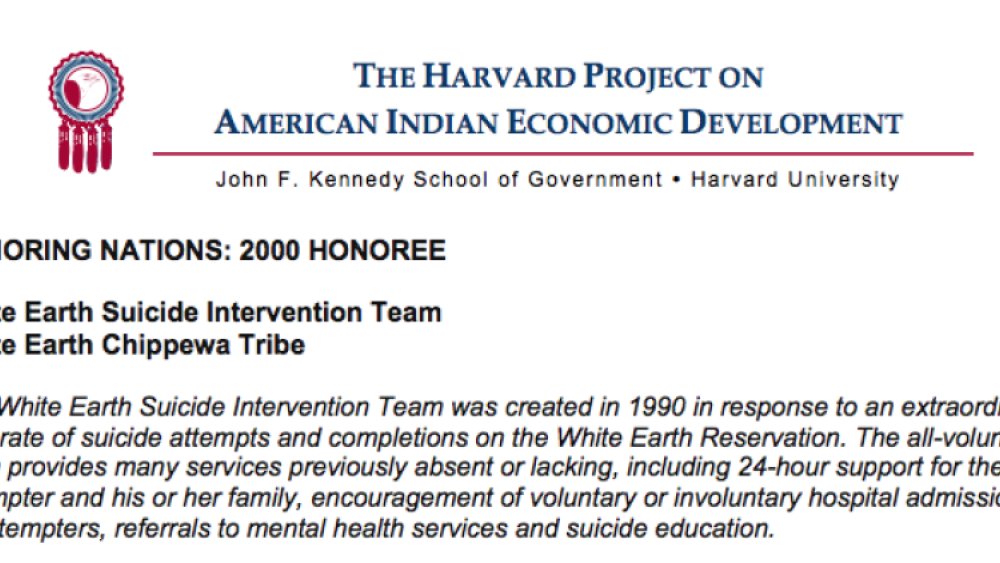
White Earth Suicide Intervention Team
The White Earth Suicide Intervention Team (WESIT) was created in 1990 in response to an extraordinarily high rate of suicide attempts and completions among tribal members living on the White Earth Reservation. With the Tribal Council’s official support, a group of volunteers came together following…
Pagination
- First page
- …
- 1
- 2
- 3
- …
- Last page
